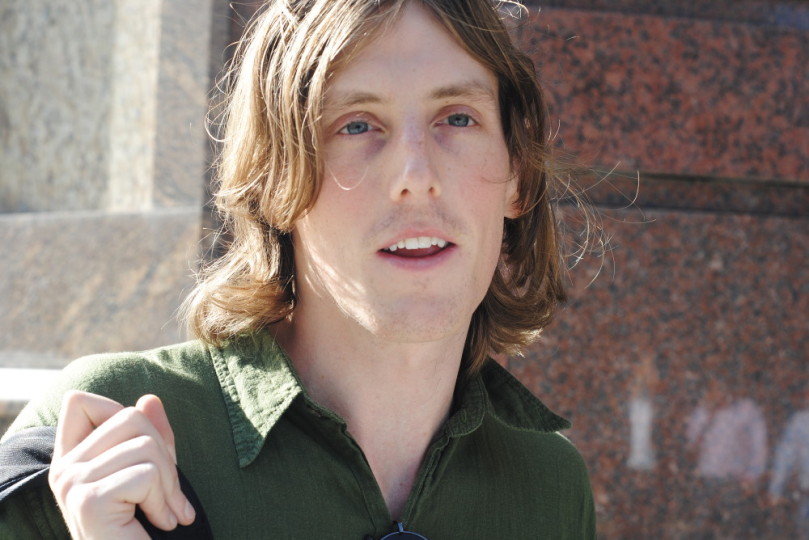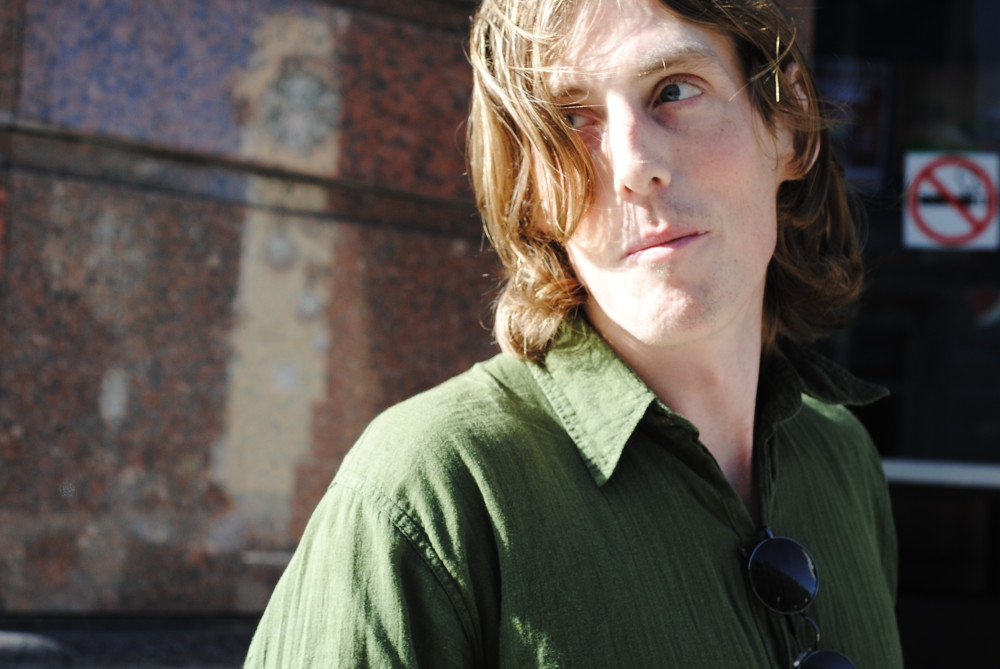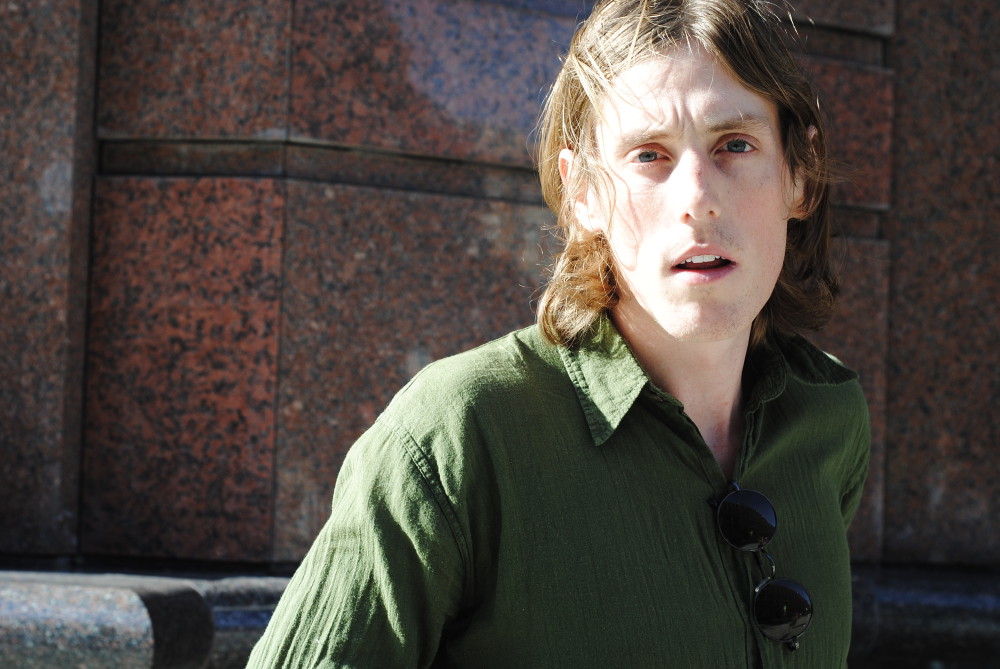American Linguistics Student Finds Fresh Ideas and Innovation at HSE

Jon Rawski came to HSE last year to study in the Master's programme Cognitive Sciences and Technologies: From Neuron to Cognition. He finds the programme, which is taught in English, to be quite satisfying because it is new – it was launched in September 2014 – and is filled with fresh ideas. The programme brings together a talented group of researchers who enjoy a considerable level of support from the university.
According to Jon, numerous programmes in the U.S. have existed for a long time and are very static in their structure. Projects depend largely on the ideas of the professors. At HSE professors guide Jon in his studies, but there is considerable room for innovation, which he greatly enjoys.
Jon recently spoke with the HSE student newspaper about his studies.
— How did you become interested in linguistics?
— Well, I originally wanted to study economics. I had always been good at math and I liked how people interact with each other. But when I started learning economics I totally disliked it. At the same time, I had always been obsessed with language, ever since I was about 5. Someone suggested that I meet with a linguistics professor, so I did, and it really opened my eyes. Linguistics is very much like mathematics, but using words instead of numbers. I thought, whoa, that’s interesting! As I went along and realized how much language is critical to human thought and mind, I was hooked.
— It has been a year since you enrolled at HSE. Do you feel that lecturers in the U.S. have more experience?
— Experience is a sort of misleading. Experience in the U.S. means that you’re a tenured professor, so professor has the same job every year. In the U.S. we have lots of tenured professors, but that’s sort of going away due to the new dependence on ‘temporary’ professors, which economists call the ‘precariat’: people without job security.
What I like about professors here is that they have quite a fresh attitude. They’re always interested in exploring everything. I had a conversation with a neuroscience professor recently and he immediately started suggesting ‘let’s start developing a project’. And in the U.S. this takes a lot of time. But here it’s something spontaneous. I love it.

— Have you studied Russian in the U.S.?
— Yes, I have. I can speak Russian but listening comprehension is still a bit challenging at times.
At my university there was literature department – they studied literature, but there was no such thing as philology. And linguistics was very mathematical. However, I also studied some languages like Russian, Spanish and Arabic just because I wanted to know them.
It was surprising to me, to come here and see how huge your philology department is. I’ve never seen a solid philology department before. So here I’m continuing my language work, but now I have a whole different set of resources.
— Have international students changed anything at HSE? Do you feel that the culture and how people communicate is changing?
— The number of international students is growing from year to year. Programmes are changing, and lots of programmes have been added and will continue to be added, which will make the school more global. It’s a good thing that foreign students come here to study. For me it’s always interesting to communicate with people from other countries, to know another world, another point of view. I think it changes something in the culture of HSE. It increases tolerance.
I’m still amazed by the fact that there are programmes in English. It’s not usual for universities to teach in their country’s minority language. It’s unusual. At U.S. universities you almost never have this opportunity. Imagine going to Harvard and studying in Spanish. It would be very strange. I really respect people who learn English as a second language.
— Living in a dorm with international students fills your life with amazing memories. What is the funniest story?
— Well, at the beginning of the year we bought some dishes, you know, to eat there. They just disappeared. No one knows where they went. Everyone started accusing each other of stealing each other’s stuff, and of course no one’s doing that. Everyone thought ‘I’m losing things too, I’m not stealing your things. What the hell is happening, where is all the stuff?’ Finally, the old lady who worked there said that our dishes were very dirty, and she put them in a bag and took it to the roof. If we needed them, we could go with her and take our dishes. They were missing for three months! We came to the roof and there were lots of bags with dirty dishes just lying there. It was like jungle of dishes there.

— Talking about food, what is your favourite place for going out in Moscow?
— I really like Muzeon Art Park, right near the river. I go to jazz cafes like Powerhouse, and mainly try to explore. For dancing, of course, places like Mishka can’t be beat. We don’t have these places in the U.S.
I’ve really fallen in love with Georgian food. There’s this great chain of restaurants called “Khachapuri”. I enjoy cooking, and like to experiment. In the dormitory I usually cook myself. I’m still afraid of cooking Georgian food though; it might not end up so well.
— Can you give any advice to new HSE international students?
— Make friends with Russian people, even if you don’t speak Russian. People have all these negative stereotypes about Russians, but in reality there’s such a world they have inside that it’s great to know them.
Also, learn Russian. It will of course help logistically but it really opens up the city since chances are those who know it best speak Russian the best.
You should also travel through Russia. The weirdest place I’ve been to was Murmansk. Two friends and I just rented a car and I was the only person who was eligible to drive. It was really difficult, driving 1,800 km in 19 hours in the Russian dark winter. We didn’t know about the train or we thought that getting there by car would be cheaper.
— Do you feel that HSE will provide you with a rich knowledge base?
— HSE is really growing, and I’m very surprised to see very famous people coming here. So you come here and you feel refreshed. For example, we wanted to set up an online student newspaper and we did it, we created Read Square. I regularly write there in the Think Tank section on things that touch the whole world and may break the balance. In the meantime, I am preparing to apply for a PhD programme.
Prepared by online student newspapers Read Square (in English) and The Vyshka (in Russian)
Photo: Stas Mikrukov
See also:
‘Learning Japanese Is a Long-Distance Race’
How can one master kanji, even with the help of sports, and why is Japanese Studies considered the pinnacle of Asian Studies? In this interview dedicated to the Japanese language, Vasilii Shchepkin and Olga Klimova discuss specific features of the language, the reasons for and experiences of learning it, as well as translation practices.
Linguists from Around the World Discuss Current Academic Issues at First Eurasian Congress
HSE University partnered with the First Eurasian Congress of Linguists dedicated to the 300th anniversary of the Russian Academy of Sciences (RAS). The congress served as a platform for discussing relevant issues in linguistics related to all language groups of Eurasia and other regions worldwide. Approximately 200 researchers from 46 foreign countries and 300 Russian linguists from 50 regions of Russia participated in the event.
'Back in School, I Decided That I Would No Longer Suppress My Feelings'
Polina Makarova initially planned to pursue a career in programming but soon shifted her focus to theoretical linguistics. In this interview with the HSE Young Scientists project, she discusses her research on grammatical agreement in the names of professions, the importance of emotional intelligence, and the benefits of keeping an eublepharid, or leopard gecko, as a pet.
'Language Surrounds Us at All Times'
The most likely place to find Anton Buzanov is at the HSE building on Staraya Basmannaya Ulitsa, where the researcher spends nearly all his time. In his interview with the HSE Young Scientists project, he recounts his experience of leading a field expedition to Sami communities, shares his affection for teenage television shows, and observes that engaging solely in activities that bring joy can prevent burnout.
HSE University-Developed Linguatest System Launched in Nizhny Novgorod
Linguatest, Russia’s first foreign-language certification system, has been launched in the Nizhny Novgorod region. The system was developed by specialists from HSE University in cooperation with the National Accreditation Agency and the Prosveshchenie group of companies, who are providing certification and publishing support for the project. Nizhny Novgorod is the first city after Moscow to offer testing under the system.
'The Applied Linguistics Programme Allowed Me to Try Something I Was Interested in While Continuing What I Am Passionate About'
Austin Garrett-Sites, from the US, is a master's student of the Applied Linguistics and Text Analytics programme in Nizhny Novgorod. Students from around the world to come to Russia to get a European education in English with viable employment prospects. Austin spoke about his impressions after the first year of study and his favourite places in Nizhny Novgorod.
What’s It Like to Work as a Computer Linguist
The IT industry is rapidly developing and incorporating new professions. Zoya Mazunina and Arina Mosyagina, linguists with Seldon and graduates of the HSE University Fundamental and Applied Linguistics programme, met with university applicants to talk about the computer linguist profession, issues of automatic language processing, and how linguists use the knowledge they gain at HSE University.
Towards Finding Practical Solutions to Socially Significant Healthcare Problems
The Centre for Language and Brain in Nizhny Novgorod started operations in September 2020. Today, it is comprised of a team of linguists - teachers and students - who are researching the relations between speech and parts of the brain. The Director of the Centre, Natalya E. Gronskaya, spoke to the HSE Look about how the neuro-linguistic laboratory appeared in Nizhny Novgorod, as well as current tasks and prospects the Centre can offer the students and the region.
‘In the Future, I Would Like to Become an HSE University Teacher’
Karina Kuzhanova, third-year student at the Faculty of Law, and Anna Yatsenko, second-year student at the Faculty of Economic Sciences, moved to Moscow from Kazakhstan to study at HSE University. They shared their impressions of studies and student life with the HSE News Service, as well as talking about some of the most inspirational things in the Russian capital.
Predicting Grammatical Properties of Words Helps Us Read Faster
Psycholinguists from the HSE Centre for Language and Brain found that when reading, people are not only able to predict specific words, but also words’ grammatical properties, which helps them to read faster. Researchers have also discovered that predictability of words and grammatical features can be successfully modelled with the use of neural networks. The study was published in the journal PLOS ONE.


